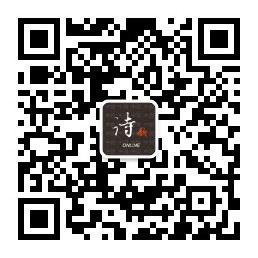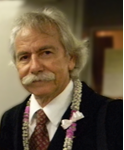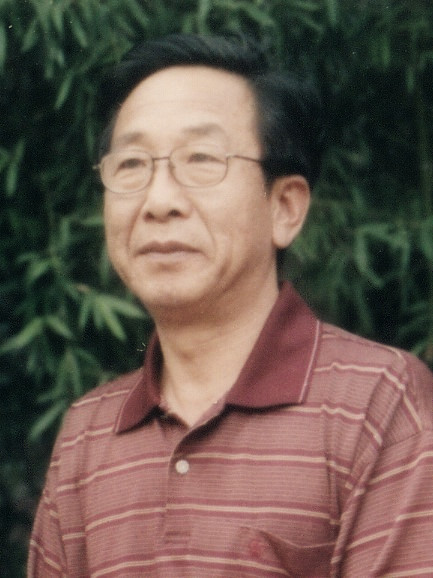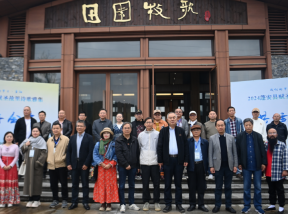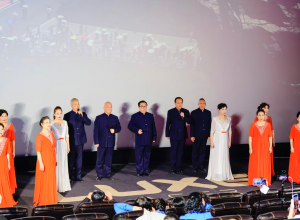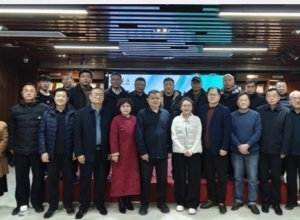|
弗兰克·斯图尔特诗选(二) 杨宗泽编译 Selected Poems of Frank Stewart(Set Two) Compiledand translated by Yang Zongze
接受割礼的男孩 ——(背景为)奥斯曼帝国,1915年
那个男孩子去了市政厅 一位法官对他说:“孩子, 你的宗教信仰非常不好, 必须摒弃。你摒弃它吗?” 男孩说,“是的,先生。” “你接受真正的宗教, 即伊斯兰教吗?” “是的,先生。” 法官说:“孩子,从现在起你的名字 将是阿卜杜勒拉赫曼·奥格卢·阿萨德。” 然后他们给了这个男孩一顶土耳其毡帽 和一条头巾,这样,每个人都能知道 他是穆斯林了。接着他接受了 割礼,是一位宗教领袖为他做的。 之后,他就可以放心地 走在街上了。但即便如此, 土耳其的男孩们还是嘲笑他, 叫他“背教者”或者“叛徒”。
The Circumcised Boy
The boy went to the city hall
And a judge told him, “Child,
Your religion is very bad
And must be renounced. Do you
Renounce it?” He said, evet, effendi,
Yes, sir. “Do you accept the real religion,
The Muslim religion?” Evet, effendi.
The judge said, “Son, your name henceforth
Will be Abdul Rahman oghlu Assad. Then they gave the boy a fez
And a turban so everyone would know
He was Muslim. Then he had to be
Circumcised,so a religious leader did that.
Afterwards, he could safely go out
On the street. But even then
The Turkish boys would taunt him,
Calling him dönme, turncoat. Ottoman Empire, 1915
天堂之书
——1915年6月,奥斯曼帝国,马拉什和代尔祖尔之间
我有一个皮质水瓶 里面装着大约一杯水 我身旁的孩子们在哭喊: 水啊!水!水啊!水! 趁别人不注意 我迅速地拿出水瓶 给他们每人滴上几滴 滋润一下他们的嘴唇 我想,那些 无比珍贵的水滴 都已被记录在天堂之书里
The Book of Heaven.
I had a leather water bottle Containing about a cup full of water The children near me were crying Choor! Choor! Water! Water! Without being seen I held out the bottle quickly Here and there to moisten The children’s lips with a few drops I think those drops Were very precious, and that they were Recorded in the book of heaven.
BetweenMarash and Dier el-Zor, Ottoman Empire, June 1915
黄瓜
——1915年6月,奥斯曼帝国,马拉什和代尔祖尔之间
从马拉什出发,走了两个小时后 我们来到了一个休息的地方 土耳其卫兵近来到处搜刮财物 他们分散在车队之中 拿走任何他们想拿走的东西—— 帽子,鞋子,长袍,腰带,手表…… 他们什么都要,什么都抢
不远处有一处黄瓜园 那些身上还剩下点钱的人 买了些黄瓜 狼吞虎咽地吃起来 我也想吃黄瓜 但我没有钱 我像个孩子一样开始抽泣
Cucumbers
After two hours of walking from Marash We were near a resting place The Turkish guards were doing their latest gleaning They scattered among the convoy Taking whatever they wanted to take— A hat, a shoe, a gown, a belt, a watch They took and they took
Nearby there was a cucumber garden Those who had any money left Bought some cucumbers and began To eat them ravenously I wanted a cucumber too But I did not have the money to buy one I began to sob like a child
BetweenMarash and Dier el-Zor, Ottoman Empire, June 1915
此外
——小汽车,奥斯曼帝国,1915年
即使是库尔德人也感到震惊。
Also Even the Kurds wereappalled.
Van, Ottoman Empire,1915
土耳其后宫的女眷们
——1915年,奥斯曼帝国,拉斯艾因沙漠
她们身着蓝色的无袖长卡夫坦长袍 肩头披着围巾 用以遮挡沙漠风沙,护住脸庞 有些女人用头巾裹住头部
有些女人头顶着垫子 当她们搬运重物时,垫子可以起到保护作用 有些女人背着布袋,里面装着婴儿 有些女人的鼻孔上戴着鼻环
她们的脸上、胸口、手上 胳膊上、脚踝处甚至膝盖上 都有着俗艳的深蓝色刺青 这些女人算是幸运的了
Turkish Harem
They wore long, blue, sleeveless caftans And scarves over their shoulders To shield their faces against the desert winds Some covered their heads with turbans
Some had cushions on their heads Which protected them as they carried heavy loads Some had babies in cloth bags on their backs Some displayed rings in their nostrils
And had garish, dark-blue tattoos On their faces, bosoms, hands, arms, ankles, And even their kneecaps These women were the lucky ones
Rasal-Ayn desert, Ottoman Empire, 1915
天可知道?
——1915年,奥斯曼帝国,拉斯艾因沙漠
牢记在拉斯阿祖尔时 那位年轻女子的忠告
妈妈把三枚里拉硬币 藏在肛门里
但我们却不敢用这些钱去买食物, 要是被卫兵发现,他们就会把钱抢走。
Who Knew?
Remembering the advice of the young woman in Ras al-Zor
Mama had hidden three lira in her rectum
But we dared not use them to buy food. We knew the guards would take them if they knew
Ras al-Ayn desert, Ottoman Empire, 1915
美貌,古老的伤悲 ——1915年,奥斯曼帝国,拉斯艾因沙漠
许多女孩把泥土或烟灰抹在脸上 以便让自己看上去很丑 妈妈每天都会告诫我: “韦尔金,别忘了往脸上抹点泥。” 她担心让士兵们注意到我 那时我才十三岁
Beauty, the Oldest Sorrow
By blackening their faces with dirt or soot Many girls tried to make themselves ugly Mama would caution me everyday
“Vergeen, don’tforget to rub dirt on your face” She was afraid a soldier would take notice Of me, I was thirteen
Rasal-Ayn desert, Ottoman Empire, 1915
被驱逐
——奥托曼帝国,托罗斯山脉,1916年
在雪松森林深处, 他们遇见用黑色山羊皮搭成的帐篷, 那是土耳其烧炭工的栖身之所。
“我们本会非常幸福的,” 神父写道,“若能留在那片静谧之地, 简简单单地生活,远离 卫兵那令人难以忍受的目光。 “我们羡慕那些贫苦的劳工, 也羡慕那些受惊的野兔, 它们从灌木丛里蹿出, 飞奔而逃。我们还羡慕鸟儿, 能自由地飞往任何它们想去的地方。 “但我们却要前往沙漠, 在那里,我们最终成为一抔尘土。”
Deportees
In the depths of the cedar forest They came upon tents of black goatskins, The shelters of Turkish charcoal makers.
“We would have been so happy,” The priest wrote, “to remain in that solitude, To live simply and free from The unbearable eyes of the guards.
“We envied those poor workers But also the startled rabbits that Jumped from beneath bushes and Dashed away. And we envied birds Free to fly wherever they wished.
“But we were going to the desert To become handfuls of dust.”
Taurus Mountains, Ottoman Empire, 1916
来世
—— 1916年,离开奥斯曼帝国的约兹加特
在被驱逐的途中 我和船长交谈。“先生,”我说, “作为一名牧师,我告诉我的教众, 如果他们不忏悔, 他们的罪孽将让他们在来世受苦, 这时候他们会心生恐惧。 那么,你将如何为自己的罪孽忏悔呢?” “我已经为我的罪孽忏悔了,”他说。 “每次大屠杀之后 我都会铺开祈祷地毯,做礼拜, 感谢真主安拉 让我有资格参与这场圣战。 “我的朋友们因为我年事已高, 都劝我退休。 还好我没有听他们的。”
The Afterlife
During the deportation I spoke to the captain. “Bey,” I said, “As a priest, I frighten my congregation When I tell them their sins Will make them suffer in the next world If they don’t atone. How will you atone for yours?”
“I already atone for mine,” he said. “After each massacre I spread my prayer rug and say my namaz, Thanking Allah For making me worthy for this jihad.
“My friends wanted me to retire On account of my old age. It’s a good thing I didn’t.”
Leaving Yozgat, Ottoman Empire, 1916
file:///C:/Users/ADMINI~1/AppData/Local/Temp/msohtml1/01/clip_image002.gif
【作者简介】弗兰克·斯图尔特:美国著名诗人、翻译家、学者和文化活动家;自1989年始,弗兰克一直在致力于一本名叫《马诺阿》(音译)的文学期刊的编译和出版,该期刊重点译介美洲及亚太地区当代作家的作品,旨在推动文学的国际化、全球性对话和文学的伦理想象。弗兰克已有十多部著作出版,其中诗集五本;此外,他还翻译了包括吉狄马加在内的众多世界当代著名诗人的诗作,并以《诗歌后面的诗歌》为名结集出版。弗兰克现为夏威夷大学英文教授,其诗歌作品曾获美国怀廷文学奖和夏威夷州政府文学奖等重要奖项,
值得特别一提的是,弗兰克于2021年出版的诗歌专集《依然在逃》。在这本书里,弗兰克用诗歌的方式对于二十世纪以来的种族灭绝暴行、战争以及战争给人类带来的苦难予以梳理、审视和批判,旨在借以推动人类之间持久的和平和友谊。这本诗集以其具有良知的学者和诗人的独特的审视角度在当代世界诗坛独树一帜,堪称弗兰克诗歌写作中的扛鼎之作,也是当下世界诗坛上一颗闪耀着人性光芒的诗歌星辰。 [Aboutthe Author] Frank Stewart: Arenowned American poet, translator, scholar, and cultural activist. Since 1989,Frank has been dedicated to the compilation, translation, and publication of aliterary journal titled Manoa. This journal focuses ontranslating and introducing the works of contemporary writers from the Americasand the Asia-Pacific region, aiming to promote the internationalization ofliterature, global dialogue in literature, and the ethical imagination inliterary works. Frank has published more than ten works, including fivecollections of poetry. In addition, he has translated the poems of manyworld-renowned contemporary poets, including Jidi Majia, and compiled thesetranslations into a collection titled The Poetry behind Poetry. His workshave won important awards such as the Whiting Award and the Literary Award ofthe Hawaii State Government. Currently, Frank serves as a professor of Englishat the University of Hawaii. It isparticularly worth mentioning that Frank published a collection of poems titledStillAt Large in 2021. In this book, Frank uses poetry to sort out, examine,and criticize the genocide atrocities, the war and the sufferings brought bythe war to humanity since the 20th century. Its aim is to promote lasting peaceand friendship among human beings. With its unique perspective of examination,this poetry collection stands out in the contemporary world poetry scene withthe profound humanistic concern for all of humanity of a conscientious scholarand poet. It can be regarded as a masterwork in Frank's poetry writing, and isalso a shining star in the current world poetry circle, radiating thebrilliance of human nature as well.
file:///C:/Users/ADMINI~1/AppData/Local/Temp/msohtml1/01/clip_image004.jpg
【译者简介】杨宗泽 (1953 — )笔名:瘦路,山东平度人,毕业于山东师范大学外文系英美语言文学专业,中学退休教师,无党派,中国作家协会会员,诗人,翻译家,后意象主义诗歌流派代表性诗人之一。1999年12月被美国世界作家艺术家协会评选为1999年度最佳翻译家,2024年12月被《中国当代诗歌导读》编委会授予第七届诗歌奖。已有诗集《浪漫季节》、《沉浮》和诗歌翻译集《贺敬之短诗选》、《吉狄马加诗选》、《桑恒昌短诗选》、《伊曼纽尔•马休诗选》等33种著作在国内外出版。杨宗泽的诗关注人生和人性、关注现实和社会问题、关注底层社会的生存状态。 [Aboutthe translator] Yang Zongze (1953 — ), his pen name: Narrow Path; was born in Pingdu City, Shandong Province; graduatedfrom English Language and Literature Department of Shandong Normal University;retired middle school teacher; nonparty; poet, poetry translator, one of therepresentative poets of the post-Imagist poetry school. In December 1999, hewas selected as the Best Translator of 1999 by the American Society of WorldWriters and Artists. In December 2024, he was awarded the title of excellentpoet of the Seventh Poetry Award by the editorial board of the Guide forReading of Chinese Contemporary Poetry. Thirty-two books of his have beenpublished at home and abroad, including a collection of poems titled My Romantic Season and Winter Without Snow,and collections of translated poems titled Selected Poems of He Jingzhi, Selected Poemsof Jidi Majia, Selected Poems of Sang Hengchang and Selected Poems of Emmanuel MAHIEU. Yang Zongze's poetry focuses onlife and human nature, realistic society and important societal issues as wellas the living conditions of the bottom society.
| 